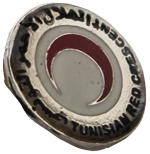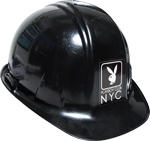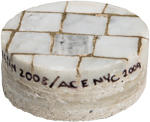Michael Buono, 41, is the CEO of general contractor Mulberry Construction & Development and vice president of New York Renaissance Group, a separate development firm with holdings in New Jersey, California and Argentina. On the 10th floor of the Radio Wave Building — where Nikola Tesla conducted electromagnetic experiments more than a century ago — Buono and his partner, Robert Lavecchia, are testing out a business model that marries two divergent roles in real estate: the GC and the developer. Their 6,000-square-foot NoMad headquarters is filled with workstations, stashes of granola bars, an old-school set of gym lockers and sprigs of bamboo that pop out along the wood and red brick interior. Buono and Lavecchia have a glass-walled office in the corner where they sit side by side at a long white desk. Buono oversees Mulberry’s finances and finagles deals, while Lavecchia manages their staff of 50 journeymen and monitors construction at various job sites. Mulberry’s salaried carpenters, millworkers and painters are assigned to projects as needed — sometimes flying to sites on commercial airlines. Buono and Lavecchia also run a fabrication studio in a Paterson, New Jersey, warehouse, where they can mass-produce furniture. Cutting out subcontractors and sidestepping unions “reduces the time and the layers,” Buono said. The two also jointly manage New York Renaissance and are building a gated community on a roughly 300-acre site in San Rafael, Argentina, as well as a mixed-use property with 50 rental apartments in Morristown, New Jersey. Buono and Lavecchia first teamed up in 2008 at the Ace Hotel, which is very close to their current office. Repositioning the pre-war Breslin Hotel from single-occupancy rooms to a hip 275-key establishment was Buono’s first real estate project (during a four-year stint on GFI Capital’s development team), and Lavecchia was the contractor on the hotel’s coffee shop, Stumptown. For Buono, working on the Ace was a baptism by fire. Fresh from his previous job as a financial analyst at KPMG, where he helped restructure the accounting firm’s hemorrhaging consultancy practice, he found himself spending up to seven days a week on the West 29th Street job site. He joined Mulberry as a partner in 2013. The firm’s CEO said he’s accustomed to bouncing around. Though he was born in New Jersey, his family shuttled back and forth between their native Argentina and the U.S. — Florida and Morristown — more than a dozen times when he was a kid. And faced with learning the ins and outs of development and construction as an adult, Buono said he basically taught himself “how to read blueprints” on the job. In its first five years, Mulberry has taken on several big projects in the city, including renovations on the Plaza Hotel, the Kardashians’ now-shuttered Dash boutique in Soho, the Chelsea celebrity hot spot 1OAK and Hugh Hefner’s son’s new Playboy Club New York, which opens in Midtown this month. “In a perfect world, the model we’re reaching for is to be able to build our own projects 100 percent of the time,” Buono said.
Tunisian Pin
 A delegate from Tunisia gave Buono this pin in 2014 during the World Urban Forum in Medellín, Colombia. The annual conference — founded and organized by the United Nations — examines urban development on a global scale, and Buono was invited that year to speak about the private sector’s role. Though he’s lost touch with the delegate, Buono keeps the pin on top of a stack of to-do lists. “It just reminds me of something outside of what I’m doing right now,” he said. “I have this interest outside of the U.S. market … so I keep it on my desk and it brings me back to that place.”
A delegate from Tunisia gave Buono this pin in 2014 during the World Urban Forum in Medellín, Colombia. The annual conference — founded and organized by the United Nations — examines urban development on a global scale, and Buono was invited that year to speak about the private sector’s role. Though he’s lost touch with the delegate, Buono keeps the pin on top of a stack of to-do lists. “It just reminds me of something outside of what I’m doing right now,” he said. “I have this interest outside of the U.S. market … so I keep it on my desk and it brings me back to that place.”
Philosophy books

A small stack of well-worn books takes up a corner of Buono’s otherwise immaculate desk. Machiavelli’s “The Prince,” Plato’s “The Republic” and Robert Greene’s “Mastery” stand out from designer monographs and lookbooks. Buono started reading philosophy at Fairleigh Dickinson University as part of a financial ethics class, then continued after hearing that Machiavelli and Greene were recommended reads for Goldman Sachs’ new investment banking recruits. “I wanted to be an investment banker for a very long time,” he said. Now, he keeps the texts close at hand so he can occasionally leaf through pages. “The unexamined life is not worth living,” Buono said jokingly.
Playboy Hard Hat
 The Bunny-branded black hard hat hangs over Buono’s desk, right beside Mulberry’s standard-issue one. Buono had to don the special hat every time he visited the new Playboy Club in Midtown West, where Mulberry was the general contractor. The club will open on Sept. 12 — marking the return of a concept that Hugh Hefner first launched in Chicago in 1960. This time, the venture is part of a partnership led by Cooper Hefner, Playboy’s chief creative officer and Hugh’s 26-year-old son from his marriage to Kimberley Conrad, the 1989 Playmate of the Year. Becoming a member of the club reportedly costs up to $250,000 per year. Buono described the design as “classic 1950s Hollywood” and referred to his clients non-jokingly as “very hands-on.”
The Bunny-branded black hard hat hangs over Buono’s desk, right beside Mulberry’s standard-issue one. Buono had to don the special hat every time he visited the new Playboy Club in Midtown West, where Mulberry was the general contractor. The club will open on Sept. 12 — marking the return of a concept that Hugh Hefner first launched in Chicago in 1960. This time, the venture is part of a partnership led by Cooper Hefner, Playboy’s chief creative officer and Hugh’s 26-year-old son from his marriage to Kimberley Conrad, the 1989 Playmate of the Year. Becoming a member of the club reportedly costs up to $250,000 per year. Buono described the design as “classic 1950s Hollywood” and referred to his clients non-jokingly as “very hands-on.”
Wounded Warrior Medallion

Buono received this medal after completing a four-day bike trip alongside injured veterans this spring in Arkansas. The “Soldier Ride” was organized by the Wounded Warrior Project — which raises money and provides services for veterans hurt in conflicts after 9/11 — as a chance for those living with disabilities to complete a journey together. The April trip was one of the rare rides where civilians could join, so Buono signed up. He described the experience as “very emotional.” “There’s all kinds of disabilities now, psychological [and] physical, so it really impacted me,” he said. “Those guys are just amazing human beings.”
Mosaic Paperweight

The circular paperweight is a salvaged memento from the Ace Hotel project. Buono scooped up the chunk of tiled floor as the electrician working on the job excavated part of what is now the Ace’s lobby. Mulberry’s CEO said he recalled thinking that it would be “a great little piece to have.” The tiled floor was originally laid in the former Breslin Hotel, which opened in 1904, and Allen Gross’ GFI preserved the floor as it converted the building.
Red Pen
 Buono organizes his life around a series of lists written on notepads he’s saved from various hotels, and he always uses the same red pen to jot down his priorities. “I’m OCD,” he said, “so I order special pens, and I can only use that one particular pen. The red is just something that I’ve taken to. There’s no rhyme or reason for it.” But if he had to guess why, Buono noted, it’s because most architects mark construction documents in red ink.
Buono organizes his life around a series of lists written on notepads he’s saved from various hotels, and he always uses the same red pen to jot down his priorities. “I’m OCD,” he said, “so I order special pens, and I can only use that one particular pen. The red is just something that I’ve taken to. There’s no rhyme or reason for it.” But if he had to guess why, Buono noted, it’s because most architects mark construction documents in red ink.
